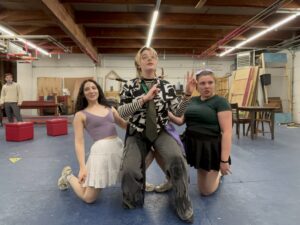A poet, a teacher, a musician, and maybe a muse — the role of Emilia Bassano in Shakespeare’s life might be up for debate, but her depiction as a proponent for the power of women is on full display in a new Shakespeare on the Saskatchewan (SOTS) show.
Written by Jessica B. Hill and co-produced by Winnipeg’s Shakespeare in the Ruins, The Dark Lady follows last year’s Iago Speaks in a growing SOTS tradition of putting on new and exciting Shakespeare-inspired plays.
Historians can’t agree whether Bassano is the mysterious “dark lady” at the core of some of Shakespeare’s sonnets, but the truth of the matter isn’t important for Hill’s fictionalized play. The relationship between Bassano (played by Hill) and Shakespeare (Eric Blais) is the core of the story, as Bassano struggles to make her mark on a world all-too-eager to shut her out for her gender, race and ideals. She helps Shakespeare with each of his new plays as they come along, becoming close with the man whose legacy rapidly outshines her own.
It’s perhaps no surprise that Hill shines as Bassano throughout. Showing a unique mastery of the script she created, Hill attacked every single line with boldness and confidence. Each decision made as a performer was well thought-out, and each line was delivered with silver-tongued precision.
Blais is no slouch playing The Bard himself, presenting a flawed and human version of the famous playwright. Oozing charm, Blais’ Shakespeare becomes a marvelous foil to the impetuous Bassano.
Along with Hill’s smart writing came the deft direction of Rodrigo Beilfuss. The community stage on the SOTS is an open-air, theatre-in-the-round stage — and Beilfuss uses every inch of the space and more, literally expanding the boundaries of the theatre with his directing. This was a master class in what theatre in the round could and should be.
A well-deserved shout-out has to go to actor and musician George Bajer-Koulack, who plays a double role as a musician and occasional extra acting role. Hill’s script weaves the importance and power of music in our memories deftly into the script, and Bajer-Koulack’s classical guitar and percussion skills became a character of their own fading in and out of scenes.
Hill packs a lot into the roughly 80-minute runtime. Bassano is forced to contend with gender roles, racial discrimination, identity and the loss of a child — none of which are easy to process. Hill deserves credit for addressing each of these themes in some fashion, but it would be next to impossible to give them all a thorough conclusion in the allotted time.
It’s difficult to say if the show was too long or too short. So much happens between characters that one has to imagine plenty of material was left on the cutting room floor — but at the same time, it seemed the show was winding towards a conclusion multiple times before we get to the actual final moments.
One of the major and recurring themes of the show is that of female empowerment. We get to see Bassano’s constant struggle to be heard, to have her words published, all while watching her friend and lover Shakespeare find success after success.
Bassano’s strength of character and relentless push to be recognized for her work was such a compelling force through the whole show, the final scene — which, without spoiling anything, is rather touching and romantic — felt a bit deflating. It was weirdly out of place to see this brilliant female character fight for so long only to surrender some of her agency and her dreams at the last minute.
Endings aside, the play does not lack for energy and audacity. It’s well-paced up until the end, the performers move around and through each other with the grace of trained dancers, and Hill’s script mixes nuanced humour with powerful messages.
Clever writing, clever directing, clever performances — there’s not much more to ask for in a great show, and The Dark Lady has it all and more. The themes of the show might get stretched thin by the time we reach the show’s conclusion, but it’s still a unique and powerful portrayal of a woman too often left on the periphery of history.
The Dark Lady runs until July 23rd at the Shakespeare on the Saskatchewan John Rayner Community Stage. More information can be found at shakespearesask.com







